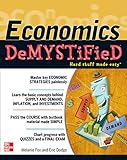Economics demystified / Melanie Fox, Eric R. Dodge.
Material type: TextLanguage: English Series: McGraw-Hill "Demystified" seriesPublication details: New York : McGraw-Hill, c2012.Description: xiv, 402 pages : illustrations ; 24 cmISBN:
TextLanguage: English Series: McGraw-Hill "Demystified" seriesPublication details: New York : McGraw-Hill, c2012.Description: xiv, 402 pages : illustrations ; 24 cmISBN: - 9780071782838 (alk. paper)
- 0071782834 (alk. paper)
- 330
- HB 171.5 F793e 2012
| Item type | Current library | Home library | Collection | Shelving location | Call number | Copy number | Status | Date due | Barcode |
|---|---|---|---|---|---|---|---|---|---|
 Libro
Libro
|
Biblioteca Juan Bosch | Biblioteca Juan Bosch | Ciencias Sociales | Ciencias Sociales (3er. Piso) | HB 171.5 F793e 2012 (Browse shelf(Opens below)) | 1 | Available | 00000177543 |
Includes bibliographical references and index.
1. Introduction to economics
Scarcity
Four economic resources
Opportunity cost
Rational decision making
Marginal analysis
Economic models
Appendix : math and graph review
2. Utility and consumer choice
Principle of diminishing marginal utility
Budget constraints
Constrained utility maximization
Spending the marginal dollar
3. Demand
The Law of Demand
Demand curves
Determinants of demand
Price elasticity of demand
Cross-price and income elasticities of demand
4. Production and cost
The inputs used in production : fixed and variable
Short-run production
Diminishing marginal product
Costs in the short run
Increasing marginal cost
5. Supply
The marginal cost curve
The Law of Supply
Supply curves
Determinants of supply
The price elasticity of supply
6. Market equilibrium
Competitive markets
Equilibrium
Efficiency in competitive markets
Price controls
Excise taxes
7. Perfect competition
Revenue and costs
Profit maximization, mathematically
Accounting profit and economic profit
Profit maximization, graphically
Economic profit and loss in the short run
Long-run adjustments
8. Monopoly
Demand, marginal revenue, and elasticity
Profit maximization
Deadweight loss
Government regulation
Price discrimination
9. Imperfect competition: monopolistic competition and oligopoly
Game theory
10. Factor markets
The choice between labor and leisure
Labor supply
Labor demand
How wages are determined
Least-cost hiring
11. Introduction to macroeconomics
Model of the economy as a whole : the circular flow diagram
Measuring the state of the economy
Counting GDP : expenditures approach
Counting GDP : income approach
GNP versus GDP : what's the difference?
12. Unemployment
The labor force
Idea of full employment
Underemployment and discourage workers
13. Inflation
Consumer Price Index
Real and nominal dollars
Consequences of inflation
Deflation versus disinflation
Employment and inflation
14. The model of aggregate demand and aggregate supply
Real GDP and nominal GDP
Model of aggregate demand (AD) and aggregate supply (SRAS and LRAS)
15. Money and the money market
Functions and types of money
The money supply
Fractional reserves
The role of the Central Bank
The Money Market
16. Fiscal policy and monetary policy
The interest rate
Keynesian Theory
Fiscal policy
Monetary policy
Applying policy actions to economic fluctuations
17. The global economy
Production possibilities
Comparative advantage and gains from trade
Foreign exchange markets
Currency appreciation and depreciation
How do exchange rates affect aggregate demand?
Balance of payments
Foreign currency and economic policy
Trade barriers
18. Public goods and the environment
Private and public goods
Positive externalities
Negative externalities
Government remedies for externalities
How can economics reduce pollution?
19. Health Economics and the market for health insurance
Healthcare markets
The market for insurance
Healthcare policy reform
20. Economic research
Uses illustrations and real-life examples to explain economics concepts and theories, and features review quizzes at the end of each chapter


There are no comments on this title.